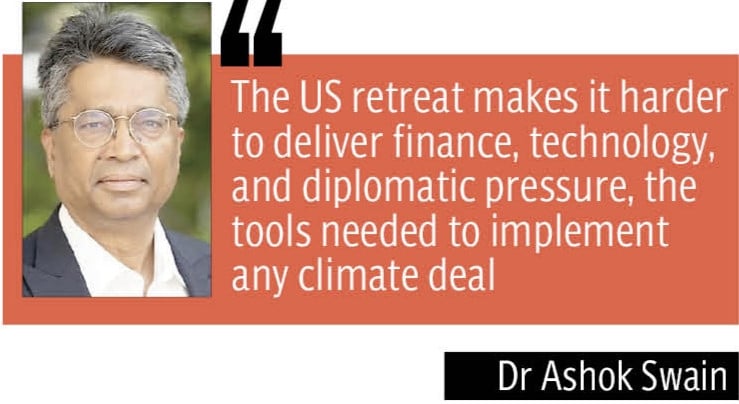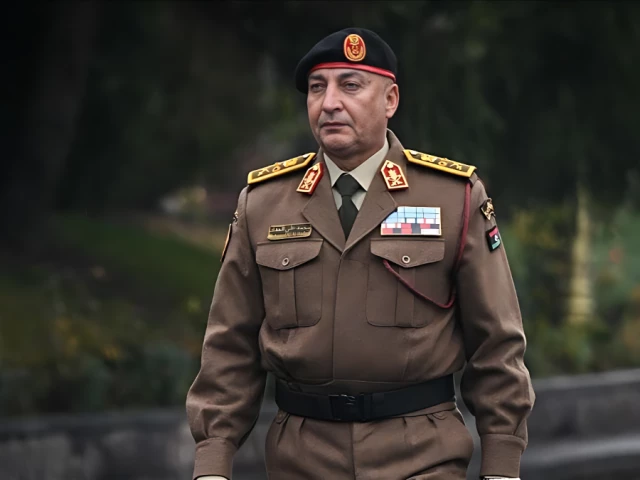PUBLISHED
November 23, 2025
KARACHI:
Triple the climate finance for developing countries by 2035 — that is the marquee promise that took shape at COP30 in Belém, the gateway to the Amazon. The pledge might sound like progress, even as it lands in a world exhausted by promises and desperate for enforceable cuts to emissions.
But the reality is that, this year, even a show of global unity seemed like a distant dream. The United States, once central to climate negotiations, stayed away. With Donald Trump back in the White House, the summit’s headline finance plan risks becoming less a breakthrough than a reminder that the world’s biggest emitter is no longer willing to play ball, or participate in any meaningful way.
Despite the glaring absence of the US, Brazil — host of this year’s COP30 summit — urged nations to unite behind a deal to strengthen international efforts, even as talks ran past their scheduled close, with countries deadlocked over how far the accord should push a shift away from fossil fuels. “The US staying away from COP30 under Trump had a major negative effect — without one of the world’s biggest emitters and funders at the table, the talks had less political weight and far fewer chances of turning into real action,” said Dr Ashok Swain, professor of peace and conflict research at Sweden’s Uppsala University and author of Climate Security.

LExperts, in their ritualistic pronouncements, cast the conference as a make-or-break moment for global cooperation, calling on nations to set aside differences and “show the world” that coordinated action remains the only way forward. But in a world where the global order is ever more fractured, such unity feels increasingly elusive.
Swain warned that Washington’s retreat makes it harder to deliver the finance, technology, and diplomatic pressure necessary to implement any climate deal, while also sending a damaging signal that powerful countries can walk away from global climate rules at will, eroding trust and encouraging others to do the same.
Like many recent COP gatherings, this year’s event has not been short of drama. As the summit ran out of time, a bitter row erupted over fossil fuels, whose emissions remain the single largest driver of the climate crisis. At the heart of the dispute, BBC reported, is how forceful a deal should be in reducing global reliance on coal, oil, and gas — a question that requires consensus among all 194 participating nations.
Inside a heavily guarded negotiating room, the temperature remained high. A negotiator described the scene to the BBC simply: “There is a lot of fighting.” Delegates were expected to finish talks at 18:00 local time, but the conference spilled into overtime, with diplomats scrambling to salvage progress before the city’s cruise ships, which house many delegations, depart on Saturday.
The United Kingdom and Brazil, led by President Luiz Inácio Lula da Silva, kept pushing for the summit to commit countries to stronger, faster action on fossil fuels, building on promises made at COP28 in Dubai. But many developing nations were reluctant, insisting that wealthier states first deliver the climate finance needed to cope with the impacts of global warming. Aisha Moriana, head of Pakistan’s delegation, told the BBC – “We need adaptation financing because we are already doing a lot to reduce emissions. Who will pay the cheque?”
Negotiators have rewritten the agreement multiple times, yet the latest iteration astonishingly ignores the elephant in the room — fossil fuels — as if ignoring them could somehow make the climate crisis disappear. French Environment Minister Monique Barbut laid the blame squarely on “oil-producing countries — Russia, India, Saudi Arabia, but joined by many emerging countries.” And why not?
Amid all the frustration, Ed Miliband, the UK’s Secretary of State for Energy Security and Net Zero, vowed to keep alive plans for a roadmap away from fossil fuels. “It’s hard, it’s sweaty, it’s frustrating. There’s a big divergence of views,” he said.
But for experts, the writing on the wall has been very clear – even with the climate clock ticking, reaching consensus on the world’s most urgent challenge remains almost impossible. Swain cautioned that the wins at COP30 appear small — modest progress on adaptation finance and trade-related climate rules — while the losses loomed larger.
“Brazil’s draft text removed all references to phasing out fossil fuels, the heart of the climate problem, because major oil and gas producers pushed hard against it. This sets a dangerous precedent: if countries can remove fossil fuels from the conversation entirely, future COPs risk becoming empty meetings that avoid the real issues,” he said.
Urgency and growing scepticism
COP30 convenes under the shadow of both urgency and deepening scepticism. Ten years have passed since the landmark Paris Agreement of 2015, when nearly 200 nations pledged to keep global warming within 1.5C above pre-industrial levels and “well below” 2C.
A decade on, the planet is already demonstrating the consequences of inaction. Heatwaves that scorch cities from Europe to South Asia, wildfires that consume landscapes in Australia and the western United States, and floods that uproot millions in South and Southeast Asia are no longer warnings—they are lived reality. Scientists have made it clear – the difference between 1.5C and 2C is more than a number – it is a chasm of human suffering, economic strain, and ecological collapse.
Despite the chorus of international rhetoric, the pace of progress remains painfully slow. While the environmental crisis has accelerated, government policies and national climate plans have consistently fallen short of the ambition required to meet the 1.5C goal. Ahead of COP30, countries were expected to submit updated Nationally Determined Contributions, detailing how they would curb planet-warming emissions. By late October, only a fraction had done so, underscoring a familiar pattern – while promises are bold, action lags far behind the urgency of the climate crisis.
The summit in Belém was not just another two-week negotiation. Once again, it was a lens into the systems, structures, and political dynamics that both enable and obstruct meaningful climate action. Climate finance sits at the heart of this conversation. Developing nations, already reeling from rising seas, shifting rainfall patterns, intensifying storms and heatwaves, depend on international support to build resilience and transition to low-carbon economies. But pledges of increased financing often trickle slowly, leaving communities on the frontline with too little and too late.
The political stakes could not have been higher. The absence of major emitters — United States under President Trump — is a warning for the world – climate action is as much a political struggle as a scientific one. Without the engagement of the world’s largest emitters, agreements risk becoming ceremonial gestures rather than enforceable instruments of change. Experts warn that this vacuum erodes trust, undermines the credibility of the COP process, and encourages other nations to resist binding commitments.
Equity adds another layer of complexity. At the summit, developing nations continued to argue that they are being asked to shoulder the burden of emissions reductions, even as wealthier countries, historically responsible for the lion’s share of greenhouse gases, have yet to deliver on promised support. This tension between responsibility and capacity has been at the heart of negotiations and complicates efforts to build consensus.
This year’s climate gathering also casts a spotlight on the legal and structural frameworks meant to enforce accountability. While the Paris Agreement established reporting and review mechanisms, penalties for missed targets are minimal, and compliance remains largely voluntary. Experts argue that without transparent monitoring and binding commitments, the cycle of lofty ambitions followed by modest implementation is likely to continue. The summit, therefore, is not merely a negotiation—it is a test of whether international climate governance can be strengthened to ensure nations are held accountable.
Beyond the mechanisms of governance, climate diplomacy is entangled with geopolitics. Energy politics, trade rivalries, and economic considerations often overshadow environmental imperatives. Oil and gas producing nations continue resisting strong language on fossil fuel phase-outs, citing economic dependencies and energy security. Emerging economies, balancing growth with climate obligations, push for delayed timelines. These tensions explain why consensus remains elusive, even in the face of overwhelming scientific evidence.
COP30, like the conferences before it, carried immense symbolic weight. But every summit sends signals about global priorities, about whether nations will act in concert or retreat into national self-interest. When fossil fuel commitments are diluted or climate plans remain incomplete, the message is unmistakable – political expediency often trumps urgency, even as the planet warms, a point widely noted by climate experts.
In the end, with climate impacts accelerating—every summit that fails to deliver carries a human, ecological, and economic cost. The urgency is intensified by political uncertainty, economic competition, and the persistent influence of fossil fuel interests. The decade since Paris has been one of promises and partial progress. COP30’s significance remained in its potential to break the cycle of symbolic pledges, to recalibrate international climate governance, and to demonstrate that collective action remains possible, even in a fractured world. For negotiators, experts, and all others watching, it is a moment to ask whether humanity can summon the ambition, solidarity, and political courage to steer the planet away from catastrophic warming—or whether, once again, the summit will become another entry in the ledger of deferred action — a pattern that seems all too familiar.
Erosion of climate ambition
As the world’s climate clock ticks ever closer to a point of no return, the broader political landscape is pulling international action in contradictory directions. Swain’s analysis of COP30 underscores a growing tension – as violent conflicts multiply and nationalism strengthens, the global climate agenda is losing cohesion.
What was once a forum for collective ambition has increasingly become a stage for countries to protect their immediate economic or political interests. COP30 exposed this fault line with greater clarity. Rather than forging bold agreements to slash emissions, the summit revealed a process edging towards incremental compromise, where the language of ambition is carefully maintained, while actual results shrink under political pressure. “The climate agenda is shifting from bold action to slow, minimal compromise,” Swain explained.
The stakes could not be higher. Emissions remain perilously high, and the summit’s inability to confront fossil fuels head-on has left the world on a trajectory toward more than 2°C of warming—well beyond the thresholds that scientists agree are safe for human and ecological systems. Swain points to this mismatch between rhetoric and reality as symptomatic of a deeper malaise: “In this environment, countries talk about ambition, but the actual results are shrinking, not expanding. Right now, the world is falling far behind.” The COP30 outcome, in this sense, reflects more than a negotiation impasse—it is a barometer of global political will in a moment when coordinated action is most urgent.
Lessons and hope
Regardless of the odds, Swain does not dismiss the possibility of progress. He highlights a parallel wave of momentum occurring outside national capitals. Cities, local governments, civil society groups, and renewable-energy companies continue to drive change even when national leaders are stalling. Technological advances in renewable energy and low-carbon solutions demonstrate what is possible, yet Swain cautions that innovation alone cannot close the gap. Without governments committing to enforceable measures, the difference between potential and reality will continue to widen. Policy, finance, and governance remain indispensable instruments, and their absence undermines even the most promising technical solutions.
Swain’s observations extend to the fragile architecture of global cooperation. The retreat of major players, particularly the United States under President Trump, threatens to fracture the international system. Smaller coalitions outside the UN framework may emerge in response, but these fragmented efforts risk undermining the universality that has long been central to global climate diplomacy. “With the US stepping back, other countries may start forming smaller climate groups outside the UN process, a trend that is more likely to make the global system even more fragmented,” he cautioned. Such divisions compound existing inequities between wealthy and developing nations, where the lack of trust over climate finance and shared responsibility continues to complicate negotiations.
Equally troubling is the political clout of fossil-fuel producers, which Swain identifies as a structural obstacle to meaningful progress. At COP30, the failure to mention fossil fuels in the final draft represents more than an omission — it sets a precedent that powerful economic interests can silence the most urgent conversation on emissions reduction. The consequences extend beyond one summit: “The failure to mention fossil fuels may make it even harder to include strong language next year,” Swain observes. Without clear commitments to address the sector driving the crisis, incremental finance pledges and voluntary measures risk amounting to symbolic gestures rather than real mitigation.
The Sweden-based academic also frames the climate emergency within the broader reality of global governance and human vulnerability. As disasters grow in frequency and intensity — storms, floods, and heatwaves increasingly displace communities — the social and political consequences of inaction become unavoidable. These events exacerbate divisions, heighten nationalistic sentiment, and increase the likelihood that climate discussions will prioritise self-interest over shared responsibility. Swain’s assessment suggests that this is the central paradox of modern climate politics – the very urgency of the crisis should spur cooperation, but geopolitical tensions, economic pressures, and entrenched interests are steering the global conversation toward fragmentation and delay.
Still, the narrative is not entirely bleak. Swain emphasises that pockets of leadership, innovation, and local action continue to emerge, demonstrating that progress is achievable. The challenge lies in scaling these initiatives and translating them into enforceable policies at the national and international levels. Without a concerted political effort, however, the gap between what science indicates is necessary and what is actually delivered will grow ever wider, increasing the human, environmental, and economic costs of delay.
In Swain’s view, the lessons from Belém are clear – ambition alone is insufficient. Without political engagement, trust, and a renewed commitment to shared responsibility, the global climate agenda risks drifting further from the urgent goals outlined a decade ago in Paris.




